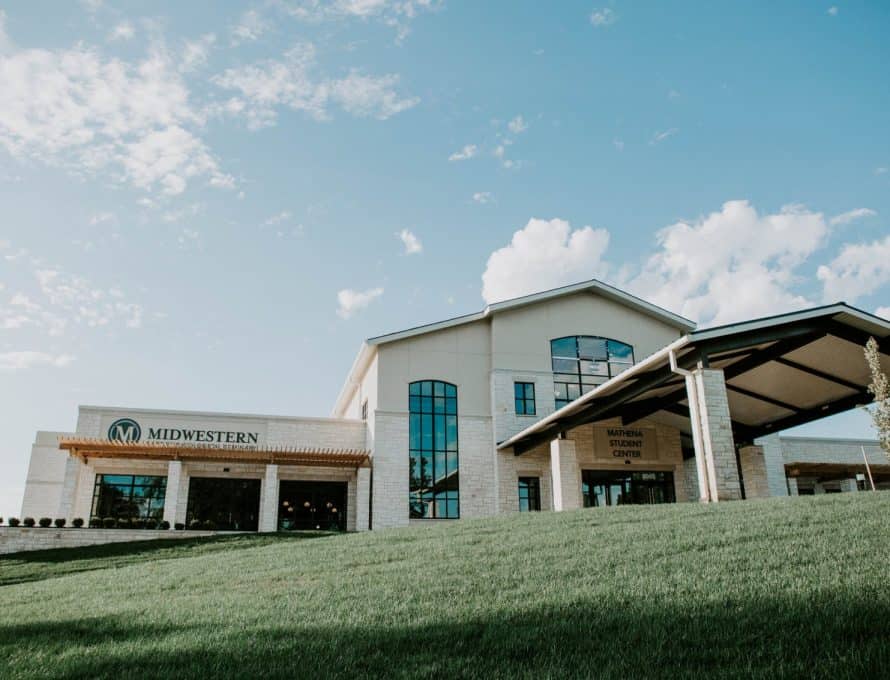KANSAS CITY, Mo. (BP) – For me, this week marks seven completed years as president of Midwestern Seminary and Spurgeon College. Annually, this season prompts personal and institutional reflection and thanksgiving. This year, it’s been doubly so.
At the personal level, I’m astonished how quickly the years have passed. We arrived in Kansas City with five children, ages 9-4, in tow. Now those same children are 16-11. For the Allen family, Kansas City has become our home, and the seminary our life’s calling.

Midwestern Baptist Theological Seminary President Jason Allen
At the institutional level, God has blessed beyond measure. In the fall of 2012, we set forth a clear vision — that Midwestern Seminary would exist for the church, an ambitious enrollment goal — 2000 students by 2020, and we perceived an urgent need — to build a sustainable business model. There was much more to do, but these were the big three.
Seven years later, Midwestern’s vision is known to all who know the institution. We are for the church. God has nearly quadrupled our enrollment, with our 2018/19 headcount hitting 4,000 students. And on the financial front, we’ve gone from annual revenues approximating $8,000,000 to north of $25,000,000, all the while more than doubling the seminary’s assets, growing them by nearly $40,000,000.
Yet, I must confess, I’m less the mastermind of this institutional transformation as I am a beholder of it. God’s answered prayers, kind providences, and the hard work of the amazing team he’s given me have propelled us forward. And from this institutional transformation, dozens of leadership lessons have emerged. Consider with me these seven.
First, vision matters. Vision is a biblical concept, but it is also a practical one. You’ll never recruit the best team, much less retain them, if they don’t know why the organization exists. The vision serves as a cohesive, pulling the organization together. It’s also a propellant, hurtling it forward. I’m convinced much of our institutional strength goes back to a vision that’s clear and compelling — for the church.
Second, conviction matters. What you believe and why you believe it are defining aspects of any self-respecting institution. As a confessional seminary, we enjoy a sacred stewardship, a singular trust on behalf of the churches we serve. Thus, we are committed to the Baptist Faith & Message 2000. We also hold to guiding documents like the Danvers, Chicago, and Nashville statements. Our charge is to prove doctrinally sound and institutionally sturdy, articulating and defending these truths from one decade to the next.
Third, culture matters. At Midwestern Seminary, we use words like stewardship, entrustment, conviction, and faithfulness. We talk about channeled ambition, church service, and gospel faithfulness. We foster an “esprit de corp” marked by a cheerful sobriety in our work and a holy camaraderie as we go about it. We aspire to be spiritually minded, to keep short accounts, and not to permit issues to fester. We root out passive-aggressive behavior and stubbornly insist that concerns go up and compliments go around.
Fourth, money matters. The Bible teaches us that where there is no vision, the people perish. Experience has taught me that where there is no money, the vision perishes. Seven years ago, the seminary was absolutely broke. The early months were a financial wasteland. Through generous supporters and enrollment growth, we’ve long since left the lean years, but you never have enough money to be undisciplined. Stewardship is key.
Fifth, people matter. We treat every hire like the seminary’s future depends on it. Once individuals join the team, we work hard to see them flourish both personally and vocationally. I rejoice in their victories, take pride in their gifting, and delight in their successes. Don’t resent it when their accomplishments overshadow your own; instead work hard for that to be the case. By keeping our employee headcount down, we’re able to pay well and provide generous benefits. We truly are a special place at which to serve.
Sixth, accountability matters. Build policies and procedures that clarify roles and goals. Know that if a person chafes at accountability, that’s not a good sign. Ministers fall due to too little accountability, not too much. At the broader, institutional level, we’ve built metrics of accountability too. We track — in minute detail — key categories such as enrollment, faculty productivity, revenues, expenditures, and the like. In leadership, you occasionally get what you expect; you consistently get what you inspect.
Seventh, goodwill matters. Seven years ago, Midwestern Seminary’s natural constituency was quite small. Our alumni base was approximately 1/10th the size of sister institutions like Southern and Southwestern Seminaries. We knew we needed to reach far beyond our historic region and constituencies. One way to do that was to be an institution of goodwill. Our churches wanted to root for us, we just had to give them a reason to do so. To this end, walk humbly. Speak kindly. Practice altruism. Return correspondence. Say please and thank you. Be servant minded. These things engender goodwill.
There’s a sense in which every aspect of the seminary deserves my attention. But to lead is to triage, to prioritize, to choose to which you must give your main focus and best energies. That’s why we’re doubling down on these seven areas and trusting the Lord to continue to grow us as we do. Will you join me in praying for Midwestern Seminary and Spurgeon College, that the next seven years will be marked by greater faithfulness and even more fruitfulness?

